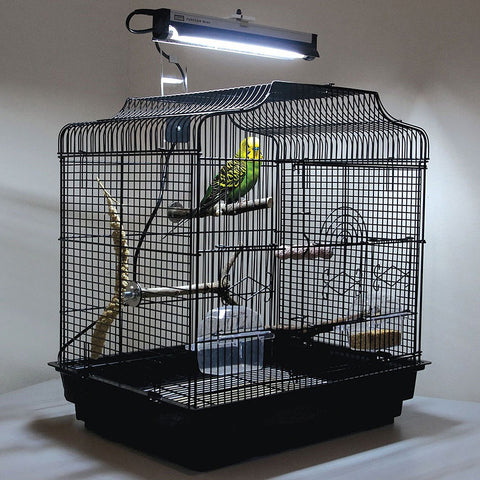Why Birds Need Proper UVB Lighting

While it is a given that most humans require vitamin D, a little-known fact is that our pet birds also require this essential vitamin. UVB rays are shown to help maintain bird health and well-being. That's because birds need vitamin D for healthy preening, a positive sense of wellbeing, healthy bones, a strong immune system, and more.
Not too different from you in fact--well, other than the preening perhaps.

Though it's been known since the early '70s that birds can see UV light, the importance of full-spectrum lighting for their vitamin D production has only recently started gaining attention.
Letting the Sun Shine in
Keeping your pet bird outside isn't usually a safe option, and windows filter out virtually 100% of the UVB rays necessary to produce vitamin D. This means coming up with innovative methods of getting your bird the UVB it needs.
How much UVB? Ideally, around 20-30 minutes of natural sun or full-spectrum lighting two to three times each week are required to keep your bird safe, happy, and healthy. Here are some ways to get sunlight to your pet bird, without risk.
- If possible, open windows to allow the sun in, preferably from the east in the morning
- Depending on the type of bird, you can try a harness, and bringing it outside
- Place the cage in a safe spot, such as an enclosed patio, where you can keep an eye on it
- Don't leave your best friend unattended outside, and cut the time in the sun when the mercury rises
Ideally, sun-basking sessions for your feathered friend should be at temperatures between 65F-85F (18C-29C), and always monitor for overheating signs like panting or wings held away from the body. If you see any, out of the sun immediately!
What if My Bird Doesn't Get Enough UV Light?
Similar to humans, birds don't function was well without sunlight. For instances, birds that don't get enough UV light are at risk for behavioral problems such as feather pulling and screaming, and they also may not breed without adequate UV rays.
Additionally, some breeds such as African Grey Parrots are prone to low calcium levels and brittle bones without enough vitamin D-producing light.
Finally, much like you do, birds enjoy sunbathing!

Alternative Solutions
Unfortunately, not all of us have access to sunny outdoor areas that are safe for birds, and there's also wintertime for us all to get through. In these cases, you can use UV lighting from your pet store.
Here at Pets on Broadway, we carry all of the necessary equipment to set your bird up in proper style, both in-store and online. We recommend utilizing the following equipment when setting up UVB lighting for your bird(s).
If you go this route, remember:
- Different lights deliver different intensities. Look for one that produces a UV index of two to four, and ideally mimics the morning sun
- Mount the bulb above the cage, not on the side. Keep it on for a minimum of two to three hours per day
- High-output bulbs should never be closer than six inches (15 cm) to the cage. Also be sure your bird has enough space to move away from the light.
- Discontinue use immediately if you observe your bird squinting, or rubbing its face. Also keep an eye on the eyes; if red, turn off the light.
- Be sure to change the bulb every six months to maintain full UV output
Winter's Coming!

Winter is on the way, and Pets on Broadway has a variety of UVB lights to ensure your feathered friend's all-important vitamin D production. Not sure which UV light to get, or have other pet-related questions? Our friendly, knowledgeable staff is here to help!
Whether your best friend has feathers, fur, or scales, Pets on Broadway has their needs covered so that you can focus on what's important: Loving them!


